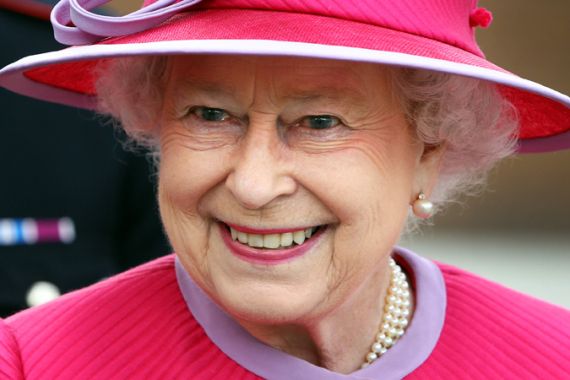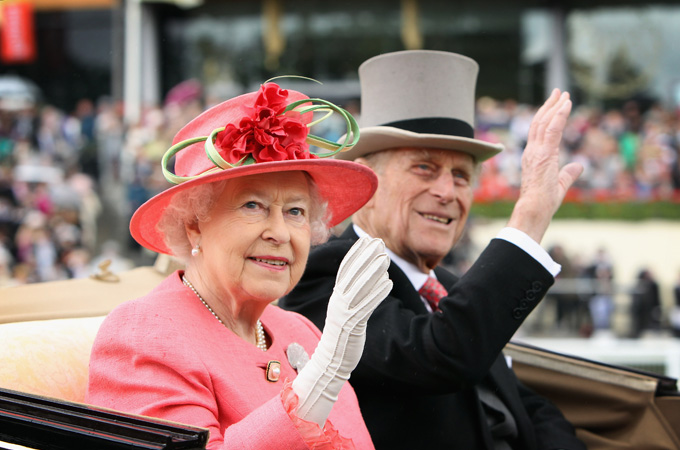What does the monarchy say about Britain?
As Queen Elizabeth II celebrates 60 years on the throne, opinions are divided over having an unelected UK head of state.

 |
| Queen Elizabeth ll is a figure of global stature, ruling over the United Kingdom and 15 other countries [GALLO/GETTY] |
London, United Kingdom – Queen Elizabeth II is celebrating 60 years on the throne. She is a figure of global stature, ruling over the United Kingdom and 15 other countries, including Canada, New Zealand and Australia. Furthermore, she is only the second monarch to reach that milestone, after Queen Victoria, who reigned from 1837 to 1901.
When she began her reign, the world was a very different place. Manchester United were English champions, as they are today, but almost everything else has changed.
Keep reading
list of 4 itemsWhat happens when activists are branded ‘terrorists’ in the Philippines?
Are settler politics running unchecked in Israel?
Post-1948 order ‘at risk of decimation’ amid war in Gaza, Ukraine: Amnesty
Her first prime minister was wartime leader Winston Churchill. Britain was then a global power at the centre of a large empire. Singapore, Uganda, Kenya and Fiji were among the countries yet to gain their independence from colonial rule.
|
UK tabloid accused of targeting royal family |
At home, basic staples such as butter, tea and sugar were rationed. This applied to everyone, so even the Royal Family had ration books. Like other children, infant Prince Charles was limited to 55 grams of sweets each week.
Mark Field, the Member of Parliament for the Cities of London and Westminster, which includes Buckingham Palace, told Al Jazeera that, as a Conservative and a monarchist, he was immensely proud to have her as one of his constituents.
“The incredible social changes in the last 60 years reinforce the case for a monarchy,” said Field. “If you started with a blank piece of paper you would not have a hereditary ruler, but the Queen is a great force for unity in these troubled times.”
There is strong evidence that most English people agree with him. According to the polling organisation Ipsos MORI, only 18 per cent of Britons want to replace the monarchy with an elected head of state.
Protest song in Scotland
In Scotland, the Royal Family is viewed with much greater indifference.
In 1952, even her title, Elizabeth II, was controversial – in Scotland, there had never been a first. A popular protest song asked: “How can ye hae the Second Liz when the First yin’s never been?”
Some on the wilder fringes of the Scottish national movement responded to this perceived insult by blowing up Royal Mail postboxes, which bore the Queen’s initials, ERII. Their campaign was clearly effective – Scottish postboxes now bear only a crown without the royal initials.
Last year’s Royal Wedding also split Britain in two. It was the biggest media event on the planet, and more than 5,500 street parties took place across the country – but fewer than 30 were organised in Scotland.
While Southern England rejoiced, the only official party planned for Glasgow, Scotland’s largest city, was cancelled because nobody wanted to come.
|
“I have a problem with the idea that some people have a higher status in society because of their birth…” – Patrick Harvie, the leader of the Scottish Green Party |
It also seems unlikely that the Queen’s Diamond Jubilee will be celebrated with much gusto on Clydeside.
“I find it hard to see a legitimate role for the hereditary principle in government or the state. I would like to see an elected head of state,” Patrick Harvie, the leader of the Scottish Green Party, and Glasgow representative in the Scottish Parliament, told Al Jazeera.
Harvie explained: “I have a problem with the idea that some people have a higher status in society because of their birth, not a problem with the monarch herself, or any of her charming family.”
Viewed with cold logic, the idea of hereditary power is very hard to justify.
Imagine the reaction if someone suggested that being manager of Manchester United or Chief Executive of Google should be a hereditary position.
Conservative MP Mark Field agrees that the principle of hereditary power is anti-democratic, but says he would not change it.
“Of course it is [anti-democratic], but in terms of providing a sense of enduring unity, the hereditary monarchy has worked extremely well. No democratic politician will ever have the widespread support that the Queen has.”
He argues that electing a senior politician – such as Tony Blair or Margaret Thatcher – as head of state would be much more divisive.
Debate in Australia
Field adds that in Australia, where there has been a robust debate about whether to become a republic, the public seems to have reached the conclusion that they don’t want another politician.
|
UK monarch in historic UAE visit |
A referendum to install an Australian head of state to replace the monarch was defeated in 1999 by a clear majority.
In the UK, Queen Elizabeth’s personal popularity prevents serious questions being asked about the monarchy, but she is 85 years old and, although she appears to be in robust health, she can’t go on forever.
One issue looming on the horizon is whether Prince Charles, who is next in line to the throne, can command the same respect.
According to Ipsos MORI, 46 per cent of Britons believe that he should give up his right to be the next monarch in favour of his eldest son, Prince William.
Harvie believes that, before either of them is crowned, there should be a referendum on whether Britain – or possibly an independent Scotland – should replace the monarchy.
If people vote “yes”, he suggests the famous naturalist, David Attenborough, as his own choice for “president”.
“If we are drawing from the pool of people labelled ‘national treasure’, somebody like David Attenborough would be high on my list. He’s so widely respected for his work, which has enriched our understanding of the world around us and the impact we’re having on it. He’s also a warm and likeable human being,” Harvie told Al Jazeera.
“If we’re talking about a head of state for an independent Scotland, how about our national poet, the Scots Makar Liz Lochhead?”
Harvie freely admits that he is currently in a minority and the shortlist for a new head of state is unlikely to be drawn up any time soon.
After six decades on the throne, Queen Elizabeth is on her twelfth prime minister. Her supporters say that she has been a source of continuity, unity and wise advice.
For others, the fact that they are subjects and not citizens makes a powerful statement about inequality. They ask: “How can Britain be fully democratic when the highest office in the land is chosen by accident of birth?”
Follow Andrew McFadyen on Twitter: @apmcfadyen